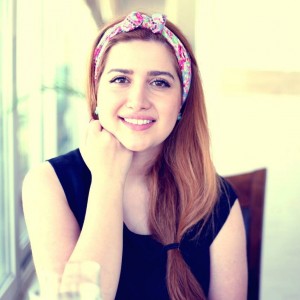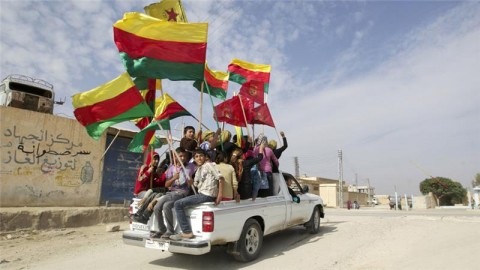
By Hanar Marouf:
When will Kurds realise the dream of being able to say, “I’m off to a one week holiday in Rojava”? The kind of dream many of our grandfathers, in all the parts of Kurdistan, wished to see although until now what choice have Kurds been given in their lands except violations and abuses? Within the rigid confines of anti-Kurd communities and organisations and the harsh fight against them, Kurds could still shine in declaring their federal and democratic system in Syria’s northeast. Amidst the increased tensions across the region, including the Turkish government’s shelling of Kurdish villages from across the border and the battle with the Syrian regime in Qamishli, Kurds have paved the way to self-rule.
After five years of bloody Civil War, the different sectarian groups aim to partition the country among sectarian lines. If this war spirals further out of control, it is more likely for the Sunnis to take the center, the Druze to have their region in the south, the Alawites to conquer the north, and the Kurds to have the northeast of Syria. In November 2013, when the Kurds declared their autonomous zone in the northeast of the country, they barely received attention. However, with Kobane’s liberation in January 2015, Kurds proved their valor in the fight. Alan Semo, representative of the Syrian Kurdish Democratic Union (PYD), stated in one of his interviews that the Kurds’ purpose is not to declare independence, but instead to have a democratic federal system in Syria.
Within the crisis in Syria affecting all its parts and groups, Kurds are trying to introduce democracy in a collapsed state. While some Kurdish areas remain under the Islamic State’s control, these territories are included in the Rojava federalism declaration process. However, how would the federal system function and to what level will it have legitimacy?
Kurds in Syria, Iraq, Iran, and Turkey have made no secret of their yearning for self-determination. The declaration of a federal system should not be the shock that some have claimed it to be. Kurds in Syria, with the development of the Civil War, managed to crystallize their supremacy over their own lands against the opposition. Within the full-scale war in Syria, the PYD and the People’s Protection Units (YPG) are being backed by Washington’s aid and airstrikes. Secretary Kerry has recently mentioned the Plan B for Syria, in which the country may fracture into a few independent states if a lasting ceasefire was remains a far-off dream. The announcement of a federal zone, embracing the three main Kurdish-held cities of Kobane, Afrin and Jazira, marked a success and a wise decision. Now the PYD, as Washington’s proxy ally, can have an effective role in the battle against the extremist group.
Does Turkey have the muscle to end Rojava Federalism?
Now the Kurds face opposition from Turkey, the Syrian regime, and even from the president of Iraqi Kurdistan who called for consensus among the Syrians in advance of a move to federalism. The situation has imposed a sort of pressure on Turkey and its allies. Now with Washington’s backing for the Kurds in Rojava, Ankara feels neglected despite the longstanding Turkish-US ties. Turkey sees the PYD as an expansion of the PKK threat into Syria. Turkey is playing the security anxiety card following the Ankara bomb attack on 17 February killing 37 innocent people, which was carried out by the Kurdistan Freedom Hawks (TAK), a group led by commanders who have split from the PKK due to disagreements. Turkey fears the emergence in its own regions of a similar decentralized system to Rojava, while some PYD-affiliated groups have released short videos stating their support for their brothers and sisters in Nusaybin, Cizre, Diyarbakir and other Kurdish parts of Turkey that face violations and curfews by the government.
Turkey has been unable to convince anyone in Washington and the West with its warnings of how the ideological resemblance of the PKK and PYD poses a threat to the world’s safety.
Since November, the Turkish air force has not flown any missions in Syrian airspace while the Russians wait keenly for this to happen so as to down a Turkish plane in same way as Turkey did with the Russian military jet some months ago. Meanwhile, Kurds in Syria receive support from the Russians, which makes it harder for Tukey to fight them. Russia’s withdrawal from Syria puts more pressure on Assad to endorse federalism in the region. To this end, Russia would do all it can to block any opportunity that might favor Turkey.
The only power Turkey can muster is by allying with ISIS or other opposition forces in order to fight the Kurds in the north. Ankara will not give up on creating obstacles for the Kurds in Syria, although this time the Kurds, with the intervention of the external powers, are stronger than ever.
With Turkish President Recep Erdogan’s latest visit to Washington DC, the White House Press Secretary reported that he would not be meeting with President Obama due to the presence of 50 other world leaders at the same time. However some analysts concluded that this really reflected the US administration’s reluctance to meet Erdogan because of the crackdown on the media and internal tensions in Turkey.
Rojava, a future for Syria
March 15, 2011 saw the start of the uprising of Syria: what has significantly changed since then? With all the killings of the elderly and children and the fleeing of 4.5 million people, and all that is still being inflicted on those who have remained, how have world policy-makers demonstrated their leadership and used their diplomatic ties in the Middle East to deal with the crisis? While the world is in danger from ISIS threats and the bloody Civil War in Syria, opposing the positive force there that fights terrorism and dictatorship is like abandoning righteousness. Within the mess in Syria, the resolution method should be through supporting any force that fights terrorism and attempts to safeguard the people of the country. The Kurds in Syria for now are the only side that has a project for the suture of the country. The people of Rojava, from behind bloody closed doors, give voice to the woes of the entire country to the world, though do we have good listeners?
Hanar Marouf is a human rights activist based in Suli and an MA student in Politics and International Relations.
.jpg)



